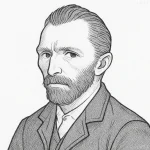“An artist needn’t be a clergyman or a churchwarden, but he certainly must have a warm heart for his fellow men.”

- March 30, 1853 – July 29, 1890
- Dutch
- Painter, Post-Impressionist Artist, Pioneer of Modern Art
table of contents
Quote
“An artist needn’t be a clergyman or a churchwarden, but he certainly must have a warm heart for his fellow men.”
Explanation
This quote emphasizes that art is not about holding formal roles of moral authority, but about possessing genuine empathy and human compassion. Van Gogh rejects the idea that artists must be sanctimonious or religious officials; instead, he insists that what truly qualifies an artist is a deep emotional connection to others. To create meaningful art, one must care—not preach, but feel.
Van Gogh’s life and work embody this belief. He often painted peasants, workers, and the marginalized, driven by a desire to honor their lives with dignity and sincerity. His brush did not judge; it revealed the humanity in the worn, the weary, and the overlooked. For Van Gogh, art was a form of solidarity, a way of expressing love for mankind not through sermons, but through color, line, and form.
Today, this quote remains a vital reminder that empathy is at the core of great art. Whether in painting, writing, or music, it is the emotional sincerity and concern for others that gives art its lasting impact. Van Gogh reminds us that you don’t need a pulpit to speak to the soul—you just need a heart open to others’ lives and struggles.
Would you like to share your impressions or related stories about this quote in the comments section?
